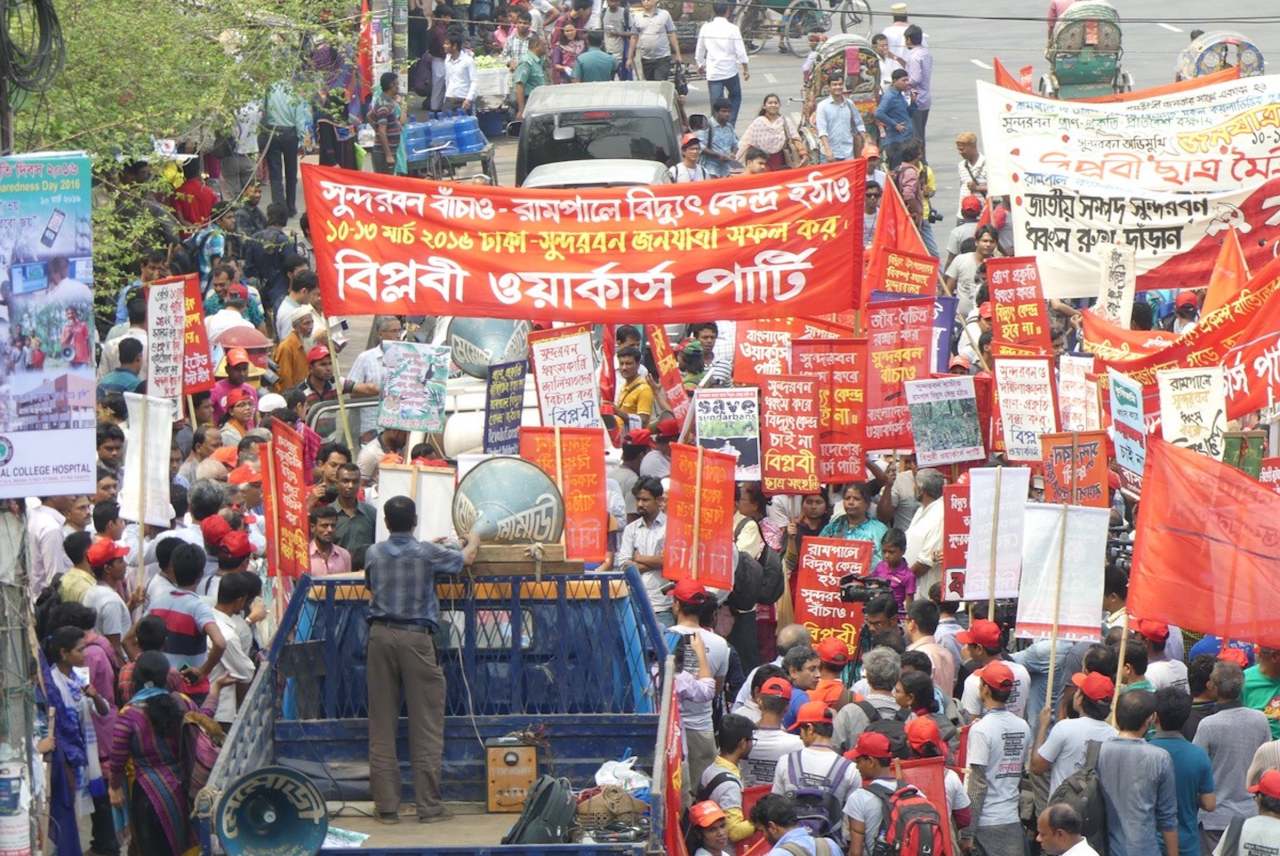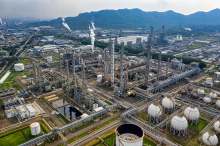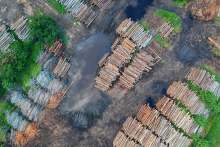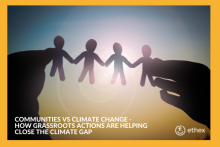We spoke to Tonny Nowshin, a researcher at environmental and human rights organisation Urgewald and a degrowth activist from Bangladesh about Barclays’ role in climate breakdown and its responsibility to change in Bangladesh and beyond.
Could you tell us a bit about some of the projects owned by companies that Barclays is funding?
Barclays is supporting the Rampal Coal Power Plant in Bangladesh which threatens the world’s largest mangrove forest, Sundarbans, a vital carbon sink.
There has been a huge movement against this power plant within Bangladesh for the last nine years.
The movement has not been able to mobilise on the streets any more due to recent government repression, so we have turned it into a global movement. We have appealed to UNESCO, as the forest is a Natural World Heritage Site. UNESCO has strongly advised against the project. However, it is still going ahead.
Barclays has provided US$300 million to NTPC – one of the main initiators of this project – through bond underwriting.
Without the financial support of Barclays this project could not go ahead. We can all see how climate change impacts are rapidly unfolding: it is not justifiable for any company to keep channelling money to such projects.
Why are these projects so damaging for the environment and communities that surround them?
We all know about the Paris Climate Agreement goal. To keep our average temperature from rising no more than 1.5 degrees, we need to drastically move away from fossil fuels. Coal is the worst of all fossil fuels because it has a higher environmental impact. It is clear from all scientific reports that we need to stop these coal projects to sustain life on this planet.
Often these projects also involve immediate violations of human rights and pollution of nature. In the case of the Rampal power planet, the pollution would cause low birth weight for 24,000 babies and pre-mature death for 6,000 people.
What do you think the responsibility of financial companies like Barclays is?
Financial companies like Barclays are market leaders and they need to act like leaders, setting an example of how to be a responsible bank.
Instead of acting like ‘banks against the future’ they need to accurately assess the risk of their investments and divest from projects like Rampal.
You grew up in Bangladesh. What is the impact of coal projects on communities and the environment in the country?
Up until now, coal hasn’t been a big part of Bangladesh’s energy sector. At the moment only 2.8% of our energy comes from coal. Yet, the government plans to increase dependence on coal up to 37% over the next decade by establishing 29 new coal power plants.
Coalmining takes away important land space for living, agriculture and nature. It depletes ground water. Coal power plants also emit huge amount of fly ash, NOx, CO2 and other heavy metals like lead and mercury, which are bad for living beings and the environment.
There is a reason why so many coal projects are now being proposed not only in Bangladesh but also many other countries in the Global South: as some early industrialised countries like the UK begin to phase out coal, companies are trying to make a last bit of money from the coal industry elsewhere. You can see that in all these projects, international companies and financiers are involved. That’s why it’s even more important to raise awareness and talk about the big banks’ role.
How are communities on the ground responding to and resisting these projects, in Bangladesh and elsewhere?
Communities recognise the impacts of these projects right away. They are the ones directly exposed – from losing homesteads and agricultural lands to being directly exposed to the pollution of power plants. We have had big movements against these projects in the past and the protest against the Rampal power plant continues today.
People on the ground are resisting such projects everywhere around the globe in a similar way, for example the fight against RWE in Germany has been long and inspiring. Now we see solidarity growing amongst the movements.
Last month, activists from Hambach forest in Germany (the site of a widely opposed coal mine) led solidarity actions supporting the save the Sundarbans movement in Bangladesh.
You’re also a degrowth activist. Could you explain briefly what that means and how it links to the banking industry?
The concept of degrowth tells us that we need to respect planetary boundaries and acknowledge that the myth of unlimited growth is unrealistic and responsible for destroying our planet.
Degrowth says it’s possible to have a good life for all within the planetary boundaries. For that we need to revise our economic activities as well as how we live on this planet to allow for sustainable co-existence for all beings. The degrowth movement questions the mainstream narrative of continuous GDP growth.
The banking industry, which is failing to recognise the risks of environmental degradation and potential economic collapse from climate change impacts, is, of course, very at odds to the concept of degrowth.
The degrowth movement criticises the financial systems for its failure to channel resources properly to the projects and areas that would ensure long term sustainability over short term higher monetary return. If the banks were operating from a degrowth philosophy, they would stop financing all environmentally damaging projects today.
What can consumers do to support these efforts?
As individuals, there is only so much we can do. As consumers, the first thing we can do is become aware of the impacts of the goods and services that we are purchasing.
Secondly, we can create pressure on our service providers, for example banks, demanding they be more responsible in their businesses. For banks it would mean demanding more accountability in how they are investing our money, switching to a more ethical bank, or asking for more information about their carbon footprint. Each year, Urgewald publishes a list of all companies that are involved in the coal industry. As consumers, we can ask that our banks do not put any money in any of the businesses on that list.
And, finally, I’d say, not as consumers but as individuals, we have more power when we are not alone. It’s good to find ways to support movements and join groups that are fighting for causes.
In a line, why should we be switching to more ethical banks?
Because we all have a responsibility to shape our future: by switching to ethical banks we make sure that we are doing our part in influencing the financing sector and in turn changing it to be better.











